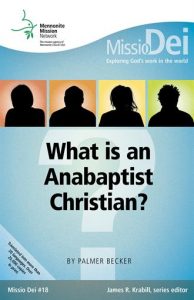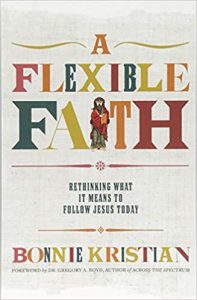Searching for Anabaptist values
![]()

Photo by Aaron Burden on Unsplash
Ah, Chicago, our Midwestern metropolis. You are out front again, this time with Lisle’s Northern Seminary’s hiring of Greg Boyd (one of the recently terminated lecturers at Brethren Fresno Pacific Biblical Seminary) as an adjunct professor. The Northern Seminary, part of the American Baptist Churches USA, is interested in Anabaptist theology and will start an Anabaptist Studies program (see Mennonite World Review, November 5.) I enjoy Greg Boyd’s blog and podcast through the MennoNerds network.
Why Anabaptism? Dennis Edwards, an associate professor at Northern Seminary, says that there are ‘current and potential church leaders who find Anabaptism resonates with their way of doing church, reading Scripture, and relating as a community in thinking about church-state relations.’ Many of these new students won’t have backgrounds in peace churches, but are deeply interested in what Anabaptism holds during these divisive times, he says.
How I wish I had the money this late in life to get that degree! Oh well, I can read on my own and think about things. A few Sunday’s ago, I gave the message (as we congregants are asked to do at times) and chose as my topic What is an Anabaptist Christian? by Palmer Becker for Misso Dei #18, with James R. Kraybill as series editor.

As I stated in an earlier post, my church (Cincinnati Mennonite Fellowship) had just finished a full weekend of fellowship, discussing and sharing a new Purpose and Identity. It was great, and I wanted to give the message on Anabaptism because we had begun to construct our next missions and attitudes toward the Bible and each other.
Below, I’ve copied the larger points of Becker’s tract. I add a few thoughts of my own after each point. Please do consider a copy for your church and/or yourself, though. My non-ethnic Mennonite husband has devoured Becker’s words and plans to have a glorious discussion with Pastor Renee about the concepts ASAP.
Core Value #1: Jesus is the center of our faith – that means the center, viewing peace and justice, missions and politics through the lens of ‘what did Jesus say?’ and ‘what would Jesus do?’
1. Jesus is to be followed in daily life – much harder than it sounds. I can get so lazy or discouraged or just plain mad at myself and the world. It takes work and courage to live up to the prophet’s example.
2. The Bible is interpreted from a Christ-centered point of view – I try to read and ‘understand’ the Old Testament from the perspective of the New Testament, but I am so ignorant of historical specifics. At church, we do benefit from having two scholars of Jewish history and law. Without their knowledge I wouldn’t even know that I don’t know.
3. Jesus is accepted as both Savior and Lord – I nod to the LGBTQ community that would like to broaden the terminology with which we surround God (‘Lord’ is a masculine and power-based word.) Pastor Renee preached a sermon this week challenging us to become more comfortable with others’ words for God.
Core Value #2: Community is the center of our life – urban churches must be intentional about this.
1. Forgiveness is essential for community – good grief, yes and Ja.
2. The Scriptures are interpreted in community – I used to skip adult Sunday School, telling myself that because I was perhaps playing in our service or doing children’s story, or leading worship, I was too tired. Now, I don’t know what I’d do without it. Adult Sunday School is really, really good! We’ve finished a study of relevant scriptures pertaining to the Journey Forward’s ‘Renewed Commitments for MCUSA,’ and next we will study J.P. Lederach’s book Reconcile.
3. Community is experienced in face-to-face groups – as an urban church, we have many small groups, partly because of our spread-out dwellings. Our kids go to different schools and we work all over the greater Cincinnati area. Developing community is a need we welcome, but it takes commitment.
Core Value #3: Reconciliation is the center of our work
1. We are to help reconcile people to God – without in-your-face proselytizing, of course. Several years ago, an aggressive man accosted me as I was working in my front yard. He was being trained by a companion to ‘welcome’ folks to a new church in our township. Wow, I thought he was going to hit me or at the very least push me to the ground and demand conversion! You know exactly what I did, though, I stood my ground and told him I was a Mennonite and a believer. The man’s companion grinned and pulled the overly-enthusiastic fellow away. Pretty brave of me, yah? But I couldn’t really pull off the act because I was shaking (from fear and anger.) Ah, reconciliation, you are a hard task master.
2. We are to help reconcile people to each other – always that, and forever difficult. Reconciliation among people who live and work together takes much more courage than the above scenario (#1) could ever require.
3. We are to be ambassadors of reconciliation in the world – here lie our missions and our involvements in social concerns: immigration, the environment, hunger, education, and yes, politics.
To conclude, I’d like to recommend A Flexible Faith by Bonnie Kristian who spoke at Anabaptist Mennonite Biblical Seminary’s recent ‘Women In Leadership’ conference. (Greg Boyd provides the foreword to her book.) Four of us from our church made the hike to Elkhart and had a wonderful weekend learning from women in the church.

Bonnie’s book references the Concentric Circles of Theology concept (Greg Boyd and Paul Eddy): in the middle is Jesus (Jesus is the center); Dogma is the next circle, ex. the Apostles’s Creed; Doctrine comes outside that circle, ex. when to baptize, or whether one believes in predestination; and the final, outer circle, the one in which we diverge most is Opinion: ex. what is the age of the earth, or what is the destiny of the unevangelized.
Our Anabaptist religion can be flexible and welcoming: Jesus is the center, dogma is what most of us can agree upon, then come doctrine and finally opinion. Certainly, if what Jesus would do is at our center, we can disagree mightily on less vital things and still see each other as believers.

Zermatt, Switzerland
Photo by Samuel Zeller on Unsplash
________________
I welcome your comments: gretaholtwriter.com/blog.
{Thank you to my niece, Addie Liechty, for taking the picture that is this blog’s featured image. Her blog is: https://addieswriting.wordpress.com.}
Best wishes and have a good week.
Greta
It’s always interesting to read who is thinking what in quarters of Christianity other than my own. This blog is top of my list.
Thank you, Mary Tom.
Greta! I’m with Mary! I am not Christian–I’m Jewish–but I really look forward to reading your blog and learning about your faith. I deeply appreciate the core values–and how you’ve explained them. People of all faiths would gain a great deal by following the underlying principles. Thanks for making them so accessible!
Your own blog, https://dianegottlieb.com/449-2/, is one I look forward to each week.
Living into the mature life is something I wish I would have done better, earlier.